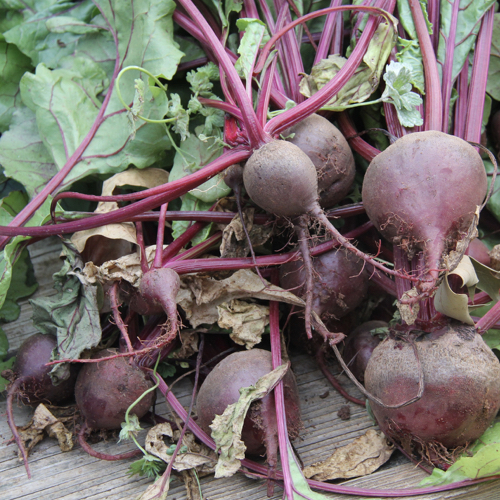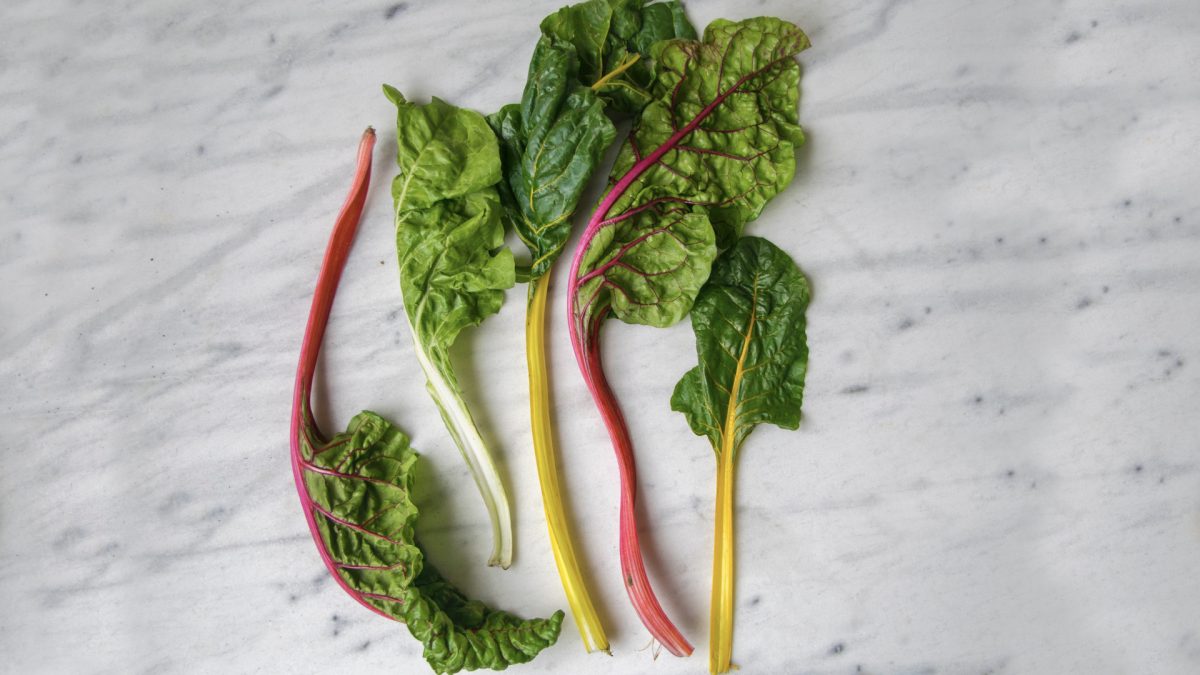
Beets
Beets, also known as beetroot, are a nutritious, health-promoting root vegetable.
Pinking Us Up
Ever noticed that your urine turns a bit pink after you eat beets? Though the color looks a little unnatural, it’s a completely harmless and temporary condition called beeturia. It’s a vivid reminder of an important fact: When we eat plant foods, many of the pigment phytonutrients that act as antioxidants in our body (such as lycopene and beta-carotene) are absorbed into the bloodstream and bathe our organs, tissues, and cells. In other words, beet pigments find their way into our urine because they are absorbed through the gut and then travel into the bloodstream, where they circulate throughout the body until eventually being filtered out by the kidneys. During this trip through the body, even our blood becomes a bit pinker too.
Rich in Nitrates
Beets, as well as greens, are rich in natural nitrates, which our body can convert into nitric oxide. This process explains why researchers have been able to show a ten-point systolic blood pressure drop in volunteers within hours of their consuming beet juice—an effect that lasted throughout the day.
Helping Our Arteries and Our Athletic Performance
Nitrates not only help deliver oxygenated blood to your muscles by helping dilate our arteries but also enable our body to extract more energy from that oxygen—something never before thought possible. One little shot of beet juice, for example, has been found to allow free divers to hold their breath for a half minute longer than usual. And, after sipping beet juice, cyclists were able to perform at the same level of intensity while consuming 19 percent less oxygen than the placebo group. Then, when they ramped up their bike resistance for an intense bout of what they called “severe cycling,” the time to exhaustion was extended from 9:43 minutes to 11:15 minutes. The beet-juice-drinking group exhibited greater endurance while using less oxygen. In short, the beet juice made the bikers’ bodies’ energy production significantly more efficient. No drug, steroid, supplement, or intervention had ever before been shown to do what beet juice could do, and this effect works with whole beets, too.
What About the Oxalates in Beets?
It isn’t only the amount of oxalates that matter, but also how well particular oxalates are absorbed. The bioavailability of oxalates in beets is relatively poor—six times less than spinach, for example. Cooking beets may cut levels by about 25 percent, too. But, for the rare person with a condition like idiopathic calcium nephrolithiasis (a type of kidney stones) who needs a low-oxalate diet, a better high-nitrate vegetable choice would be arugula.
For substantiation of any statements of fact from the peer-reviewed medical literature, please see the associated videos below.
Image Credit: UGA College of Ag & Environmental Sciences / Flickr. This image has been modified.
Popular Videos for Beets

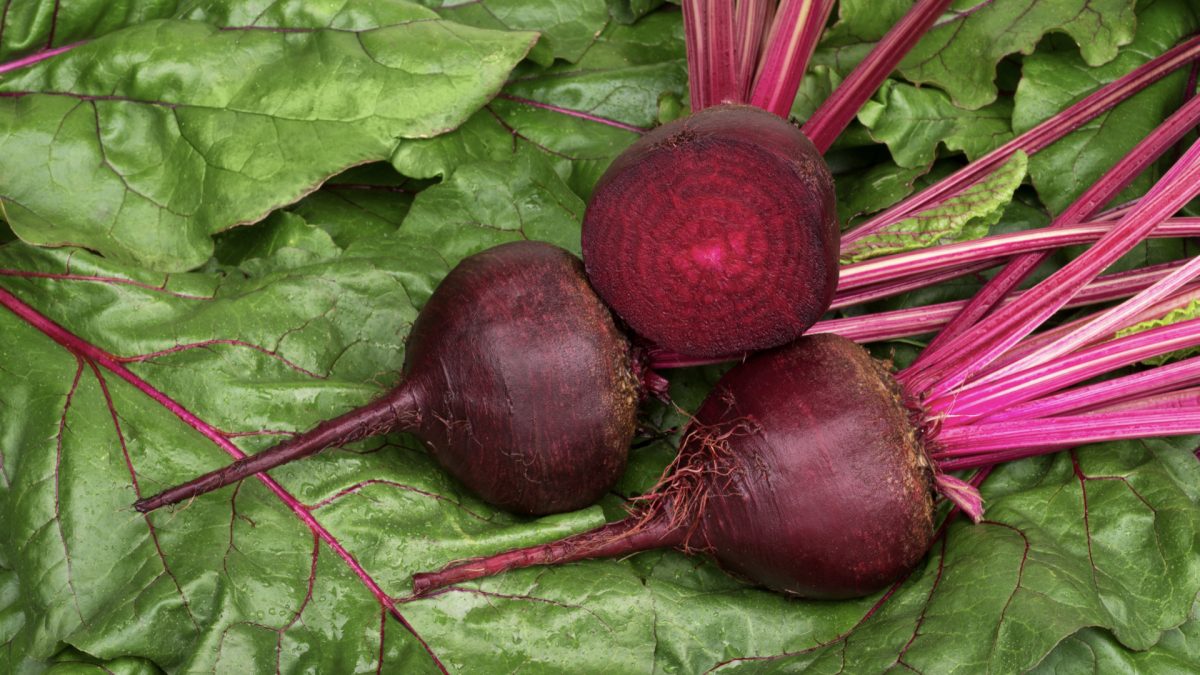
Best Brain Foods: Greens and Beets Put to the Test
Cocoa and nitrite-rich vegetables, such as green leafies and beets, are put to the test...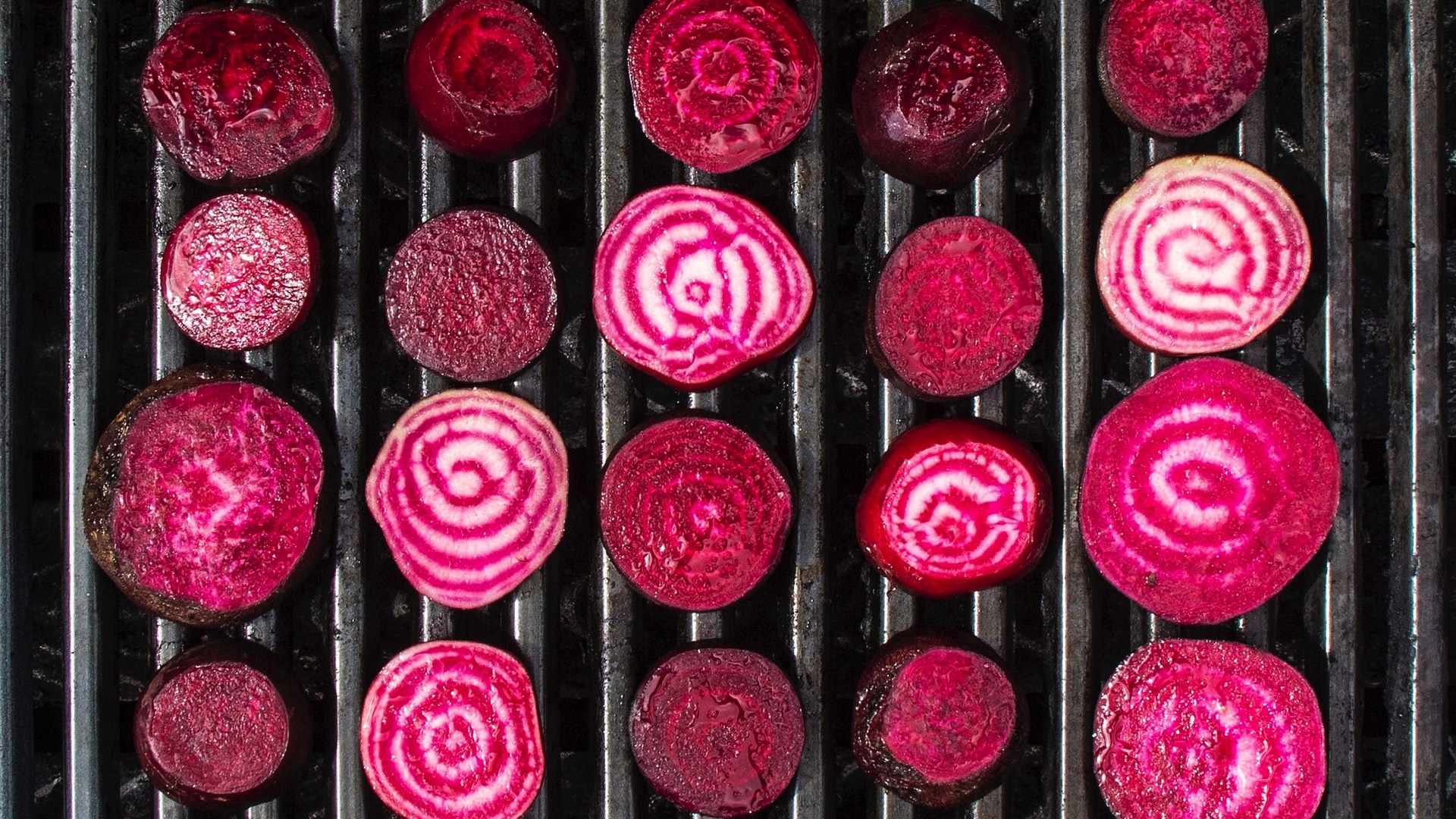
“Veg-Table” Dietary Nitrate Scoring Method
What is the optimal timing and dose of nitrate-containing vegetables, such as beets and spinach,...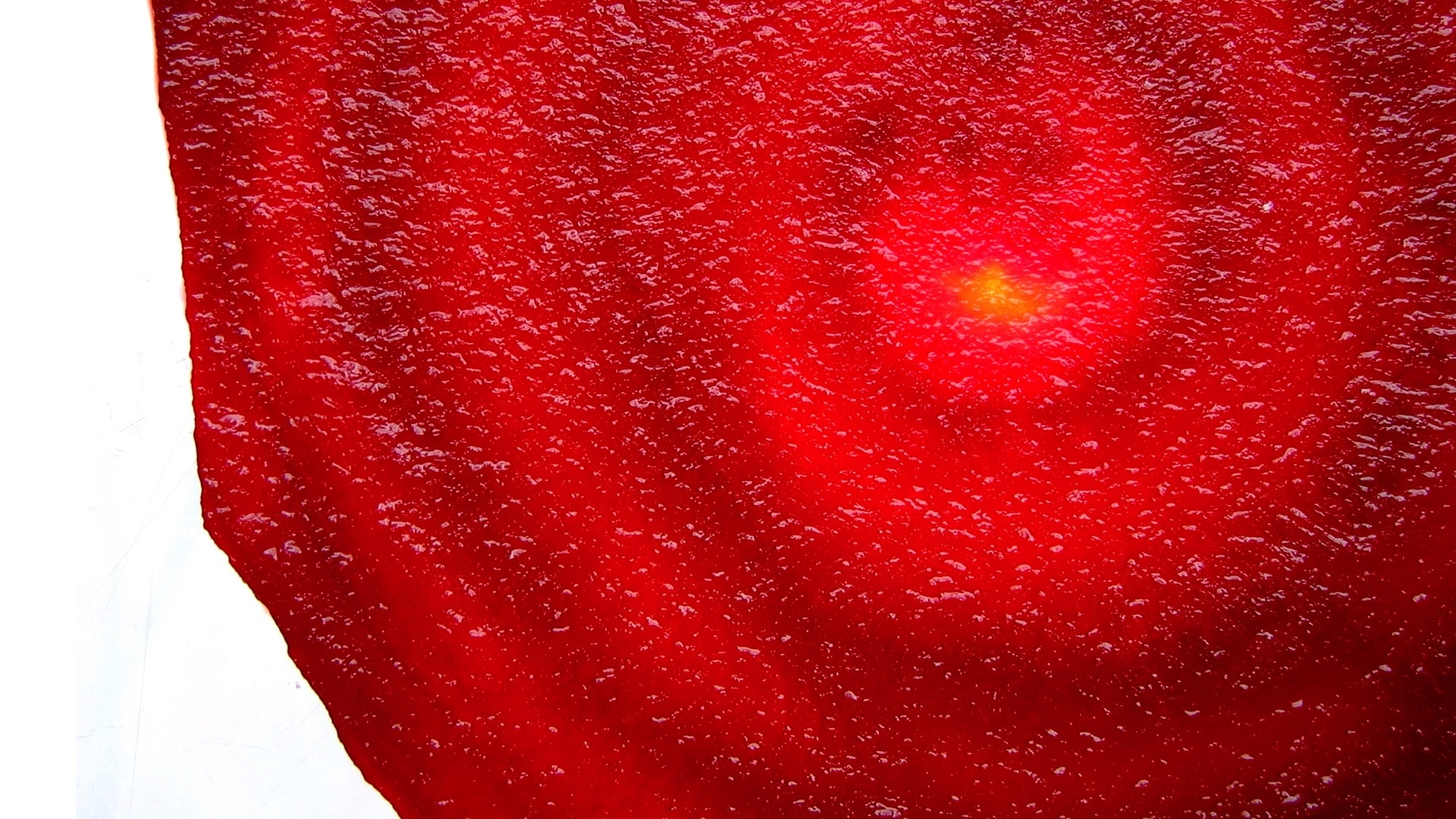
Whole Beets vs. Juice for Improving Athletic Performance
What is the latest science on the performance-enhancing qualities of nitrate-rich vegetables?All Videos for Beets
-

How Tongue Scraping Can Affect Heart Health
Tongue scraping can boost the ability of the good bacteria in our mouth to take advantage of the nitrates in greens to improve our cardiovascular health.
-

Kidney Stones and Spinach, Chard, and Beet Greens: Don’t Eat Too Much
Given their oxalate content, how much is too much spinach, chard, beet greens, chaga mushroom powder, almonds, cashews, star fruit, and instant tea?
-

Oxalates in Spinach and Kidney Stones: Should We Be Concerned?
Even though dietary oxalates may have a limited effect on kidney stone risk in most people, there are some predisposing factors that can put anyone at risk.
-

Best Foods for Halitosis and Gingivitis
The best and worst foods for bad breath and gum inflammation.
-

Best Brain Foods: Greens and Beets Put to the Test
Cocoa and nitrite-rich vegetables, such as green leafies and beets, are put to the test for cognitive function.
-

Best Brain Foods: Berries and Nuts Put to the Test
Randomized controlled studies put nuts, berries, and grape juice to the test for cognitive function.
-

Are There Benefits of Energy Drinks?
The effects of Red Bull and Monster brand energy drinks on artery function and athletic performance.
-

Dr. Greger in the Kitchen: My New Favorite Beverage
Dr. Greger blends up a vegetable smoothie inspired by a recipe in his How Not to Die Cookbook.
-

The Best Way to Get Vitamin D: Sun, Supplements, or Salons?
If one is going to make an evolutionary argument for what a “natural” vitamin D level may be, how about getting vitamin D in the way nature intended—that is, from the sun instead of supplements?
-

Slowing Our Metabolism with Nitrate-Rich Vegetables
The reason greens are associated with a significantly longer lifespan may be because, like caloric restriction, they improve our energy efficiency.
-

Fennel Seeds to Improve Athletic Performance
What are the pros and cons of fennel fruits as a cheap, easy-to-find, light-weight, nonperishable source of nitrates?
-

Antibacterial Toothpaste: Harmful, Helpful, or Harmless?
Is triclosan in Colgate Total toothpaste safe in regards to the nitrate-reducing bacteria on our tongue and potential endocrine-disrupting effects on thyroid function and obesity?
-

“Veg-Table” Dietary Nitrate Scoring Method
What is the optimal timing and dose of nitrate-containing vegetables, such as beets and spinach, for improving athletic performance?
-

Oxygenating Blood with Nitrate-Rich Vegetables
Vegetables such as beets and arugula can improve athletic performance by improving oxygen delivery and utilization. But, what about for those who really need it—such as those with emphysema, high blood pressure, and peripheral artery disease?
-

Whole Beets vs. Juice for Improving Athletic Performance
What is the latest science on the performance-enhancing qualities of nitrate-rich vegetables?
-

Which Vegetable Binds Bile Best?
Which foods are best at removing carcinogenic bile acids from the body: asparagus, beets, broccoli, cabbage, carrots, cauliflower, collards, eggplant, green beans, kale, mustard greens, okra, or peppers? And do they work better raw or cooked?
-

Which Seaweed Is Most Protective Against Breast Cancer?
Nori seaweed snacks may favorably alter estrogen metabolism by modulating women’s gut flora, resulting in decreased breast cancer risk.
-

Neurobiology of Artificial Sweeteners
The disconnect between sweetness sensations coming from our tongue, and the lack of a caloric feedback loop in the gut, may result in overeating.
-

So Should We Drink Beet Juice, or Not?
In the context of a healthy, plant-based diet, the nitrates in vegetables can safely be converted into nitric oxide, which can boost athletic performance, and may help prevent heart disease.
-

Vegetables Rate by Nitrate
If nitrates can boost athletic performance and protect against heart disease, which vegetables have the most—beans, bulb vegetables (like garlic and onions), fruiting vegetables (like eggplant and squash), greens (such as arugula), mushrooms, root vegetables (such as carrots and beets), or stem vegetables (such as celery and rhubarb)?
-

Hearts Shouldn’t Skip a Beet
The nitrate in vegetables, which the body can turn into the vasodilator nitric oxide, may help explain the role dark green leafy vegetables play in the prevention and treatment of hypertension (high blood pressure) and heart disease.
-

Pretty in Pee-nk
Beeturia, the passage of pink urine after beetroot consumption, is a reminder that phytonutrients circulate throughout our bloodstream—explaining the connection between “garlic breath,” and the use of garlic as an adjunct treatment for pneumonia.
-

Asparagus Pee
Young infants, and perhaps those with recurrent oxalate kidney stones, should avoid beets. But most commonly, the chief side effect is beeturia, the harmless passage of pink urine, though not all are affected—akin to the malodorous urine (“stinky pee”) that sometimes results from asparagus consumption.
-

Out of the Lab Onto the Track
Randomized, double-blind, placebo-controlled, crossover studies convinced the scientific establishment that nitrate-rich vegetables (such as beets) could noticeably improve athletic performance.
-

Don’t Use Antiseptic Mouthwash
The natural flora on our tongue (lingual bacteria) are essential for the athletic performance-enhancing effect of the nitrates in vegetables such as beetroot.
-

Priming the Proton Pump
To understand how beets could reduce the oxygen cost of exercise while improving athletic performance, one must review the biochemistry of energy production (ATP synthase), and the body’s conversion of nitrates to nitrites into nitric oxide.
-

Doping with Beet Juice
Beets found to significantly improve athletic performance while reducing oxygen needs—upsetting a fundamental tenet of sports physiology.
-

Anti Up on the Veggies
Greens rank highest in chemical antioxidant assays (such as ORAC, TEAC, TRAP, and FRAP). But which vegetables lead the pack when cellular antioxidant activity is measured?
-

Stool Size Matters
Larger bowel movements are associated with lower risk of appendicitis, colon cancer, constipation, and diverticulitis.
-

Best Cooking Method
Which are the gentlest cooking methods for preserving nutrients, and which vegetables have more antioxidants cooked than raw?
